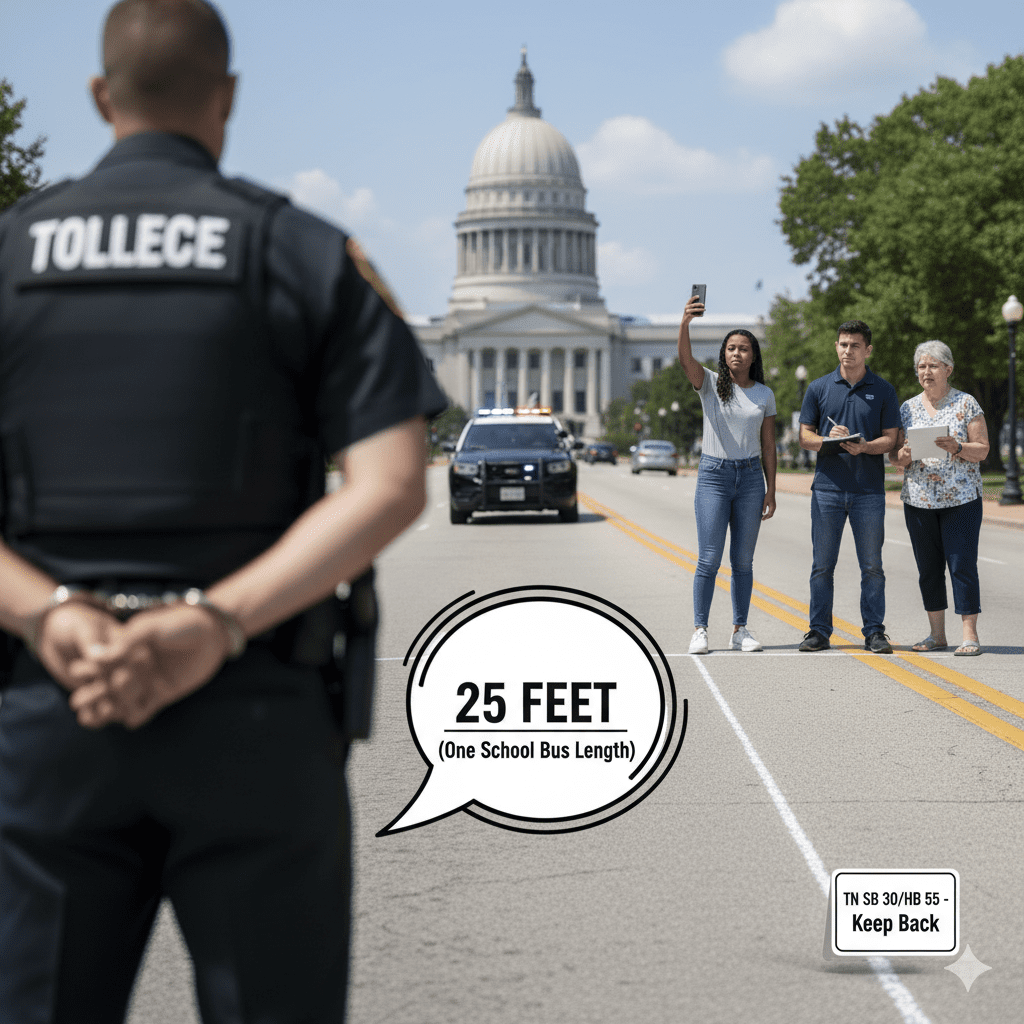This summer, the Tennessee legislature signed a bill that introduced a new host of misdemeanors into law. SB 30/HB 55 was amended once before becoming enforceable law, with a second amendment failing on the House floor, and went into effect on July 1, 2025. One of those misdemeanors has garnered particularly heightened scrutiny – a new provision making it illegal to approach within 25 feet of law enforcement when they are actively carrying out their official duties after being told to stop.
In this article, we discuss this new “halo” provision, why it has caused some controversy, and how you can make sure you don’t get arrested the next time you get close to law enforcement.
The New Law as It Stands
Under the new law, approaching within 25 feet of an officer who is actively carrying out law enforcement duties – such as making an arrest – can result in a Class B misdemeanor. For the restriction to apply, the officer must be lawfully performing their duties and must first direct bystanders to keep their distance. These duties are situations such as traffic stops, investigating suspected crimes, or responding to immediate threats to public safety.
Concerns and Controversies
Tennessee’s branch of the ACLU has called the bill “dangerous,” particularly for its over-broad language and possible First Amendment constraints. The law makes no difference between media, bystanders, and “good Samaritans” – if police tell you to stand back when they are in the progress of their duties and you do not observe the 25-foot difference, you could be arrested.
Both the ACLU and other state lawmakers mentioned George Floyd’s 2020 arrest as a particular touchstone of concern. The ACLU states that, should this bill or one like it have been in effect at the time of Floyd’s arrest and resulting death, “bystanders would never have been able to record the footage that became essential evidence to hold the officer accountable for his actions.” Senator Raumesh Akbari specifically mentioned Floyd when clarifying whether or not this bill criminalizes filming law enforcement.
Lawmakers have made it clear that this law is not intended to discourage people from filming or interacting with law enforcement. It does not criminalize recording, talking to, or otherwise engaging with police, only that a certain distance must be maintained while doing so. In the final state senate hearing, bill sponsor Senator Mark Pody reiterated several times that members of the public are not barred from engaging with law enforcement, just that they may be required to maintain that 25-foot distance while doing so.
How to Comply
On its face, the law seems easy to obey – when an officer is engaged in one such official duty (like arresting someone) and asks you to stay back, you need to stand back the 25 feet as required by law – about the length of a school bus. You are free to film, engage verbally, or otherwise interact with law enforcement so long as you maintain that 25-foot distance.
Curiously, when asked by fellow Senator Jeff Yarbro, Senator Pody clarified that this only covers when police are lawfully engaged in their duties. This implies that if law enforcement is breaking the law while, say, arresting someone and unlawfully using excessive force, then this 25-foot ban is not in place. How exactly members of the public can accurately determine in the heat of the moment, especially in a situation like George Floyd’s arrest, if a police officer is obeying the law will likely be a heavily litigated subject if it ever becomes a legal issue.
Worried About An Arrest? Call Us Today
Being arrested is stressful and overwhelming, but you don’t have to go through it alone. We’ll stand by your side, explain your options clearly, and fight for your best possible outcome. Contact PNC Law today at (615) 785-2000 or philip@tncriminaldefenseattorney.com to get the defense you deserve.

